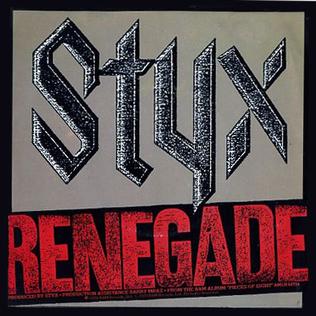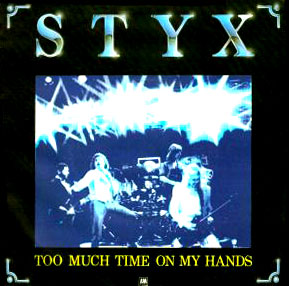
Styx is an American rock band formed in Chicago, Illinois, in 1972. They are known for blending melodic hard rock guitar with acoustic guitar, synthesizers mixed with acoustic piano, upbeat tracks with power ballads, and incorporating elements of international musical theatre. The band established themselves with a progressive rock sound during the 1970s, and began to incorporate pop rock and soft rock elements in the 1980s.

Cyclorama is the fourteenth studio album by Styx, released in 2003. This was the first studio album with Lawrence Gowan, following the departure of group co-founder Dennis DeYoung in 1999. It was also the latter of two albums to feature Glen Burtnik, and the only album released by the Lawrence Gowan/Tommy Shaw/James "JY" Young/Glen Burtnik/Chuck Panozzo/Todd Sucherman lineup, and as such the only original Styx album to feature four different singer-songwriters as opposed to the usual three. The album peaked significantly higher on the Billboard album charts than Styx's previous release, Brave New World (1999), ending up 48 slots higher at No. 127, but paled in comparison to previous 1970s and 1980s releases on A&M Records.

Dennis DeYoung is an American singer, songwriter and keyboardist. He was a founding member of the rock band Styx and served as its primary lead vocalist and keyboardist from 1972 until 1999. DeYoung was the band's most prolific and successful writer, having been credited as the writer of more Styx songs than any other band member. DeYoung penned seven of the band's eight Billboard top 10 singles as well as a solo top 10 single.

Paradise Theatre is the tenth studio album by American rock band Styx, released on January 16, 1981, by A&M Records. It was the band's most commercially successful album, peaking at #1 for 3 weeks on the Billboard 200 in April and May 1981 (non-consecutively). It was also the band's fourth consecutive album to be certified triple-platinum by the RIAA.

Kilroy Was Here is the eleventh studio album by the American rock band Styx, released on February 22, 1983. A concept album and rock opera about a world where rock music is outlawed, it is named after a famous World War II graffiti tag, "Kilroy was here." It was the last album of original material to be released by the "classic" lineup of Dennis DeYoung, Tommy Shaw, James "J.Y." Young, John Panozzo, and Chuck Panozzo.

Styx II is the second album by American band Styx, released in July 1973.

Styx is the debut album by American rock band Styx. It was released in 1972.

Caught in the Act is a live double album by Styx, released in 1984. It contains one new song, "Music Time," which was released as a single, reaching #40 on the Billboard Hot 100 charts.

Return to Paradise is the second live album by Styx, released in 1997, and their first album after signing with CMC International. It features songs from their successful reunion tour with Tommy Shaw, but without John Panozzo, who died in July 1996. It includes three new studio tracks, "On My Way," "Paradise," and "Dear John." Shaw wrote the latter as a tribute to Panozzo, while "Paradise" featured upon Dennis DeYoung's solo album and was newly recorded with the band.

Brave New World is the thirteenth studio album by Styx, released in 1999. It is the band’s first studio album to feature drummer Todd Sucherman, replacing John Panozzo, who died in 1996 and the last album to feature keyboardist/vocalist Dennis DeYoung. This is the last album that bassist Chuck Panozzo is credited as a full-time member, he would continue with the band as a part-time member. The album peaked at #175 on the Billboard 200 and reached the top 10 on the Top Internet Albums chart. However, its position on the Billboard charts was the lowest from a Styx album of new material since 1973's The Serpent Is Rising.

"Renegade" is a 1979 hit song recorded by the American rock band Styx on their Pieces of Eight album. Although songwriter Tommy Shaw and fellow Styx guitarist James Young usually played lead guitar on their own compositions, Shaw asked Young if he, Young, could take the solo on "Renegade". Young agreed, and Young later returned the favor by allowing Shaw to play lead on his "Half-Penny, Two-Penny" on the Paradise Theatre album. When performed live from 1978 to 1983, drummer John Panozzo increased the tempo of the drum pattern during the guitar solo sections. Also, the track would serve as the drum solo spot for Panozzo during that time frame.

"Lady" is a 1973 power ballad written and performed by the rock band Styx. It was first released on Styx II and was a local hit in the band's native Chicago, but initially failed to chart nationally. The song gained success shortly after Styx left Wooden Nickel Records to move to A&M Records in 1974 as it began picking up airplay nationwide, eventually peaking at #6 on the Billboard Hot 100 in March 1975. The power ballad was later re-recorded for the 1995 Styx compilation Greatest Hits due to a contractual dispute between A&M and Wooden Nickel.

Greatest Hits Part 2 is a 1996 compilation album by the rock band Styx and a follow-up to Greatest Hits, another compilation album released in 1995. The album features 14 previously released Styx songs as well as two new songs, "Little Suzie" and "It Takes Love". Major omissions that were not included on either Greatest Hits packages are 2 top 40 charted singles, "Why Me" and "Music Time".

"Don't Let It End" is the third track and the second top 10 single on the 1983 album Kilroy Was Here, by Styx. The song is also reprised at the end of the album.

"Sing for the Day'" is the second single that Styx released from their album Pieces of Eight. It reached #41 on the U.S. Billboard Hot 100 pop singles chart in February 1979. It was later the B-side of their next single “Renegade”. Tommy Shaw used the name ‘Hannah’ in the song, to represent his fans. Several years later, he named his newborn daughter Hannah. The album version that lasts 4:57, was edited down to 3:40 for the single version.

"The Best of Times" is a song by American rock band Styx, released as the first single from their tenth album Paradise Theatre. It reached No. 1 in Canada on the RPM national singles chart, their second chart-topper in that country, and No. 3 on the US Billboard Hot 100 for four weeks in March and April 1981. In the UK, the song peaked at No. 42 on the UK Singles Chart.

"Too Much Time on My Hands" is a song by American rock band Styx, released as the second single from their tenth album Paradise Theatre. It was written and sung by Tommy Shaw, who also plays the lead guitar solo during the break in the song. It was Shaw's only top 10 single as a writer and vocalist with Styx.
"Paradise" is the only single release from Styx's 1997 live double album Return to Paradise. The song was originally written and recorded by Dennis DeYoung for his musical The Hunchback of Notre Dame. The song was re-recorded by Styx for inclusion as one of three new studio tracks on the live album.

Styx: Hits from Yesterday and Today: Recorded Live is a compilation album containing songs by the band Styx. It was released in 2001. It takes four songs from Styx's previous studio album, Brave New World and two of the three studio tracks from Styx's previous live double album, Return to Paradise, and combines them with four live tracks from the previously released Arch Allies: Live at Riverport.

Rockers is a compilation of songs by the band Styx. It was released in 2003. The album is notable for deliberately omitting any songs for which former member Dennis DeYoung was the primary or sole writer; even DeYoung-penned signature ballad-to-rocker hits such as "Queen of Spades", "Suite Madame Blue", and "Rockin' the Paradise" are missing. It was an attempt by the remaining members of the band to reposition Styx as a hard rock band and move away from the DeYoungian ballads that had marked the last few albums of their career and most of their biggest hit singles.



















